What we value план урока 5 класс
Обновлено: 06.07.2024
Свидетельство и скидка на обучение каждому участнику
Зарегистрироваться 15–17 марта 2022 г.
Unit 3: Values
Theme: What we value
School: M.Zhunusov
Teacher ’s name: Yermekkalievs G
Number present:
Learning objectives(s) that this lesson is contributing to
5.S3 give an opinion at sentence level on a limited range of general and curricular topics
5.W4 write with support a sequence of extended sentences in a paragraph to give basic personal information
5.C2 use speaking and listening skills to provide sensitive feedback to peers
Lesson objectives
All students will be able to
Discuss the meaning of values
Learn topical vocabulary
Write the description of a good person
Most students will be able to
Discuss the meaning of values and create their own list of values
Learn topical vocabulary with opposites
Write the description of a good person using at least 3 new words
Make a card and give feedback to his partner
Some students will be able to
Discuss the meaning of values and create their own list of values
Learn topical vocabulary and use them in their speech
Write the description of a good person using at least 5 new words
Make a card, express his/her feelings and give feedback to his partner
Success criteria
Writing task:
Learners achieve if they will write:
with grammar accuracy (allowed to make 2 mistakes)
with spelling accuracy (allowed to make 2 mistakes)
using at least 5 new words
Cross curricular
Psychology, Art, Technology, Society and Environment
Previous learning
Intercultural awareness
Students will understand that values are common for people all around the world
Pastoral care
Assure you met all learners’ needs
Give learners choice and voice
Create a learner-centered classroom with learner friendly atmosphere
Make sure that you contribute to learners’ social, emotional, physical and moral wellbeing
Health and safety
Make sure learners have been advised about good practice when using computers and similar equipment
Everyday classroom precautions
Planned timings
Planned activities
Pass around a box filled with questions connected to the topic of the lesson. Play music, when the music stops, the child with the box must pick out a question, read it and answer. Suggested questions: Do you love your family? Do you have a best friend? What is money? What is health? What is happiness? How often do you help your mother? etc.
2. After students have verbalized as many "important things" as they can think of, explain that many of these "things" can be called "values." Hand out and read the beginning sentences of "What Is a Value?"
3. From the list of values on the chalkboard and on their handout, ask the students to consider which four are the most important to them. Let them explain which four they have chosen and why.
Activity 2: Discussion
Divide students into pairs, let them tell each other about their best friend at school, and out of school. Is it the same person? Then let them discuss these sayings. Do they agree with them?

create extended sentences in a paragraph to give basic personal information.
Value links
‘Mangilik Yel’. 2) National unity, peace and harmony in our society.
Cross curricular links
Whiteboard for PPP
Previous learning
Planned activities
I. Org. moment
Checking the absence and the presence of the students
II. Warm up. A game “Magic box”. Take a box and answer the questions in the box (whole class work).
(Teacher passes around a box filled with questions connected to the topic of the
lesson. Then she plays the music, when the music stops, the child with the box
must pick out a question, read it and answer.)
Do you love your family?
Do you have a best friend?
What is friendship?
What is health?
What is happiness?
How often do you help your mother? etc.
III. New lesson
Activity 1. “What is value?” Think and answer the questions.
(Teacher allows students to realize what is “value”, that they do have values and to identify what some of these values are.)
Referential question:
T: There are some things in life that are very important. I believe that education is very important. What are some things that you believe are very important?
T: Many of these "things" can be called "values."
Activity 2. New vocabulary. Look at these words and repeat after the teacher.
(Teacher gives the list of values which can be the qualities of a friend.)
Adjectives: fun, kind, loyal, helpful, friendly, honest
fun kind loyal helpful






Verbs: to share, to trust, to support, to gossip, to argue, to fight
Concept-checking questions:
With what friend do you always laugh? – fun friend
Which friend always helps you? – helpful friend
Which friend doesn’t lie? – honest friend
Which friend has the kind heart? – kindly friend
Which friend always supports you? – loyal friend
Which friend has a lot of friends? – friendly friend
When you want to say your problem to your friend, what do you do? – share
When you have some secrets and you say it to your friend, why do you do this? – trust
When your friend has a problem, what do you do? – support
When friends say bad words about your friend, what do they do? – gossip
When people have disagreement, what do they do? – argue
When boys arguing, what do they do? – fight
Activity 3. Multi presentation “Qualities of a friend” (group work).
(Teacher divides class into two groups and gives the resources from which they should draw the flowers with 6 petals. There they discuss and write what are good actions we value and what are not good actions. Teacher observes if learners know the difference between behaviour we value and behaviour that isn’t good.)
1 st group task.
1) Discuss and find out what good actions we value in our friends.
2) Write down good values on the petals.
3) Present your poster using new vocabulary.

good values = loves a friend; helps a friend; helps family at home; shares problems with friends; trusts his/her friend; supports a friend, etc.
2 nd group task.
1) Discuss and find out what bad actions we don’t value in our friends.
2) Write down not good values on the petals.
3) Present your poster using new vocabulary.

not good values = not speaking to a friend; fights when playing; argues with a friend; doesn’t help at home; takes people’s things; gossips about a friend, etc.
Activity 4. Short essay “My best friend”/“My family” (group work).
1 st group task. Complete and make up the sentences about your best friend.
1. My best friend’s name is . .
2. She/ He is my best friend because . .
2 nd group task. Complete and make up the sentences about your family.
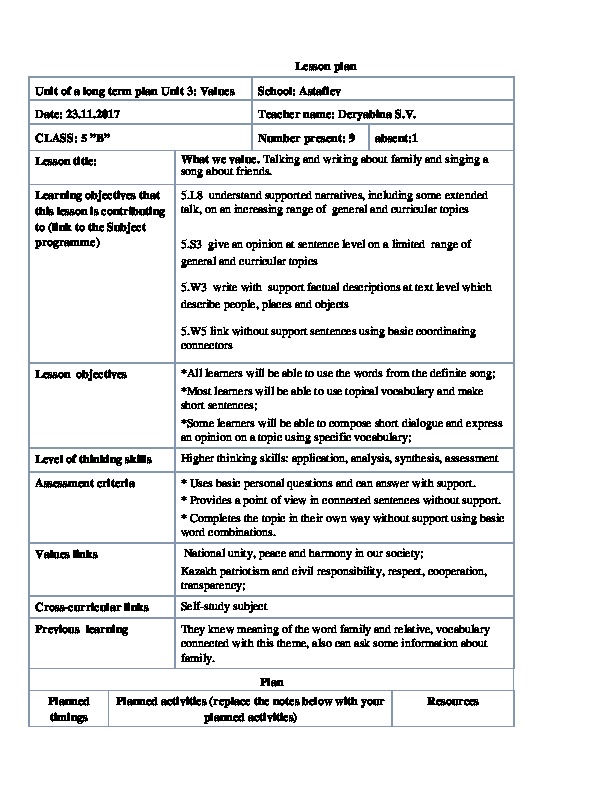
Бесплатное участие. Свидетельство СМИ сразу.
До 500 000 руб. ежемесячно и 10 документов.
Unit of a long term plan Unit 3: Values Date: 23.11.2017 School: Astafiev Teacher name: Deryabina S.V. Lesson plan CLASS: 5 ”B” Lesson title: Learning objectives that this lesson is contributing to (link to the Subject programme) Lesson objectives Level of thinking skills Assessment criteria Values links Crosscurricular links Previous learning Number present: 9 absent:1 What we value. Talking and writing about family and singing a song about friends. 5.L8 understand supported narratives, including some extended talk, on an increasing range of general and curricular topics 5.S3 give an opinion at sentence level on a limited range of general and curricular topics 5.W3 write with support factual descriptions at text level which describe people, places and objects 5.W5 link without support sentences using basic coordinating connectors *All learners will be able to use the words from the definite song; *Most learners will be able to use topical vocabulary and make short sentences; *Some learners will be able to compose short dialogue and express an opinion on a topic using specific vocabulary; Higher thinking skills: application, analysis, synthesis, assessment * Uses basic personal questions and can answer with support. * Provides a point of view in connected sentences without support. * Completes the topic in their own way without support using basic word combinations. National unity, peace and harmony in our society; Kazakh patriotism and civil responsibility, respect, cooperation, transparency; Selfstudy subject They knew meaning of the word family and relative, vocabulary connected with this theme, also can ask some information about family. Planned timings Planned activities (replace the notes below with your Resources planned activities) Plan Start 3min Middle 5min 5 min Org. moment. Some people value friendship, money, travelling, entertainment. But there is more important thing in our lifeour family. Two boys and girls go to the blackboard. The teacher pins on the tables with words Father, Mother, Sister, Brother. Children recite the poem: Father, mother, sister, brother hand in hand with one another. Pupils guess the theme of the lesson. They take part in setting goals: to use the words orally and in written form, to make sentences, to ask and answer the questions, to sing a song, to read and play a dialogue. 1.Word Work. *Revision of the words: Dad, Mum, brother, sister, uncle, aunt, granddad, grandma, cousin, parents. Pupils work in pairs asking each other: What’s the English for…? What’s the Russian for…? *Assessment First children assess themselves. After that children assess each other using red, green or yellow smile which they draw on the partner’s assessment sheet. Then children comment on their assessment to each other. The teacher asks pupils if the goal is achieved. If it is achievedthey put a red apple on the tree of goals. *Dictation Writing the words: Dad, Mum, brother, sister, uncle, aunt, granddad, grandma, cousin, parents. *Checking *Assessment First children assess themselves. After that children assess each other using red, green or yellow smile which they draw on the partner’s Learners stand in a line with pinned pieces of paper. Class recites the poem in chorus. Card with words Assessment sheets, colored pencils, the tree of goals, red apples Assessment sheets, colored pencils, the tree of goals, red apples 3 min 5 min 3 min 3 min assessment sheet. Then children comment on their assessment to each other. The teacher asks pupils if the goal is achieved. If it is achievedthey put a red apple on the tree of goals. *Using family words in labeling family tree. *Checking *Assessment First children assess themselves. After that children assess each other using red, green or yellow smile which they draw on the partner’s assessment sheet. Then children comment on their assessment to each other. The teacher asks pupils if the goal is achieved. If it is achievedthey put a red apple on the tree of goals. *Making sentences on the theme “Family”. Group work. *Assessment First children assess themselves. After that children assess each other using red, green or yellow smile which they draw on the partner’s assessment sheet. Then children comment on their assessment to each other. The teacher asks pupils if the goal is achieved. If it is achievedthey put a red apple on the tree of goals. *Relaxing minute. Singing family song using fingers. *Assessment First children assess themselves. After that children assess each other using red, green or yellow smile which they draw on the partner’s assessment sheet. Assessment sheets, colored pencils, the tree of goals, red apples Assessment sheets, colored pencils, the tree of goals, red apples Assessment sheets, colored pencils, the tree of goals, red apples Assessment sheets, colored pencils, the tree of goals, red 5 min 5 min End 3 min apples Assessment sheets, colored pencils, the tree of goals, red apples Assessment sheets, colored pencils, the tree of goals, red apples Then children comment on their assessment to each other. The teacher asks pupils if the goal is achieved. If it is achievedthey put a red apple on the tree of goals. 2.Reading *Pupils read the dialogue by roles. *Assessment First children assess themselves. After that children assess each other using red, green or yellow smile which they draw on the partner’s assessment sheet. Then children comment on their assessment to each other. The teacher asks pupils if the goal is achieved. If it is achievedthey put a red apple on the tree of goals. 3.Speaking *Trellis Method *Whole class Pupils stand in two lines at the blackboard facing each other. Those who stand backwards to the blackboard ask questions. Those who stand in front of them answer the questions. They speak about families. *Assessment First children assess themselves. After that children assess each other using red, green or yellow smile which they draw on the partner’s assessment sheet. Then children comment on their assessment to each other. The teacher asks pupils if the goal is achieved. If it is achievedthey put a red apple on the tree of goals. *Playing a dialogue Pair work Pupils make their own dialogue about their families and role play it. *Assessment First children assess themselves. After that children assess each other using red, green or yellow smile which they draw on the partner’s assessment sheet. Then children comment on their assessment to each other. The teacher asks pupils if the goal is achieved. If it is achievedthey put a red apple on the tree of goals. Assessment. Traffic light. Feedback. The teacher gives comments about learners work and awards learners. If they get green sticker excellent work, if yellowgood work, if redsatisfactory work. Pupils take their stickers and put them on the board. Home task: Writing and speaking “My family”.
План открытого урока по английскому языку в 5 классе по теме "What we value" c самоанализом

План открытого урока по английскому языку в 5 классе по теме "What we value" c самоанализом
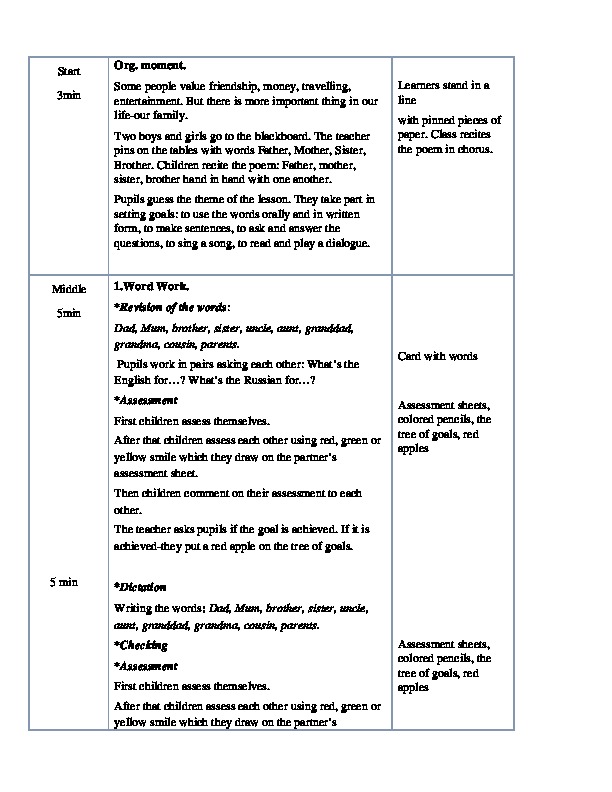
План открытого урока по английскому языку в 5 классе по теме "What we value" c самоанализом
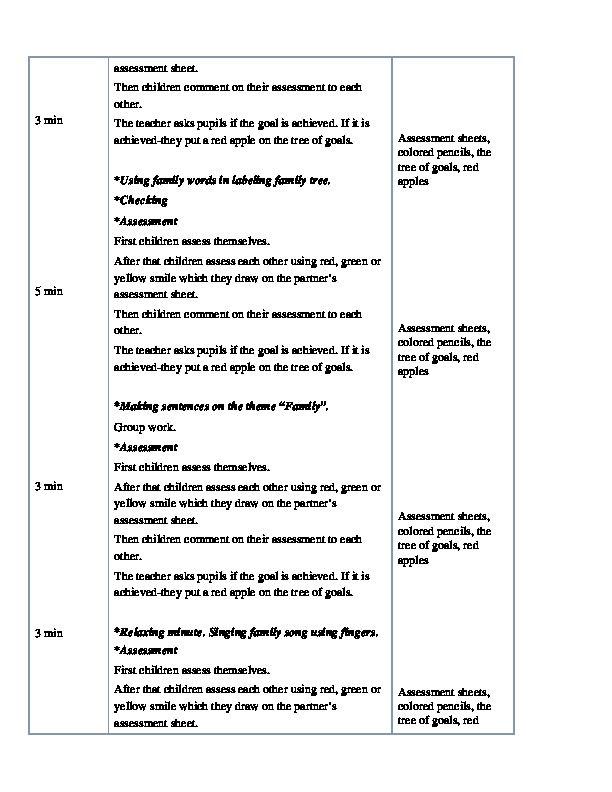
План открытого урока по английскому языку в 5 классе по теме "What we value" c самоанализом
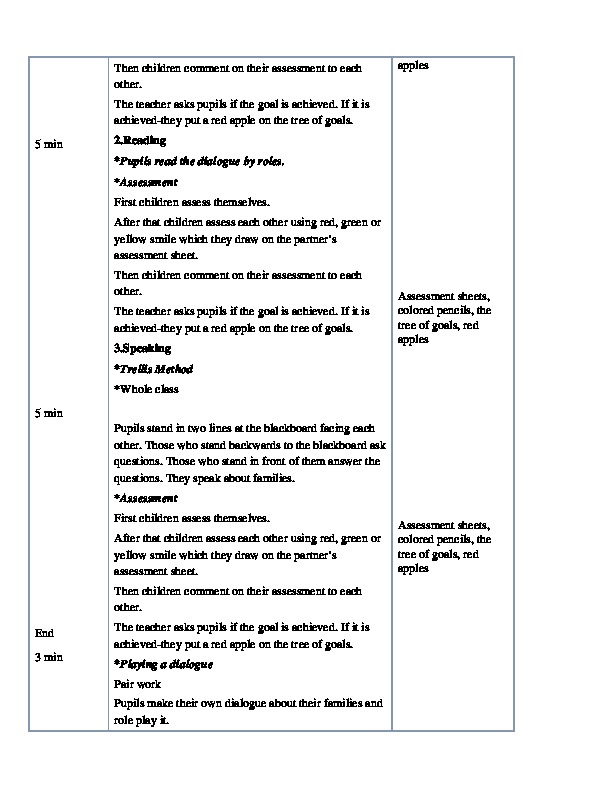
План открытого урока по английскому языку в 5 классе по теме "What we value" c самоанализом
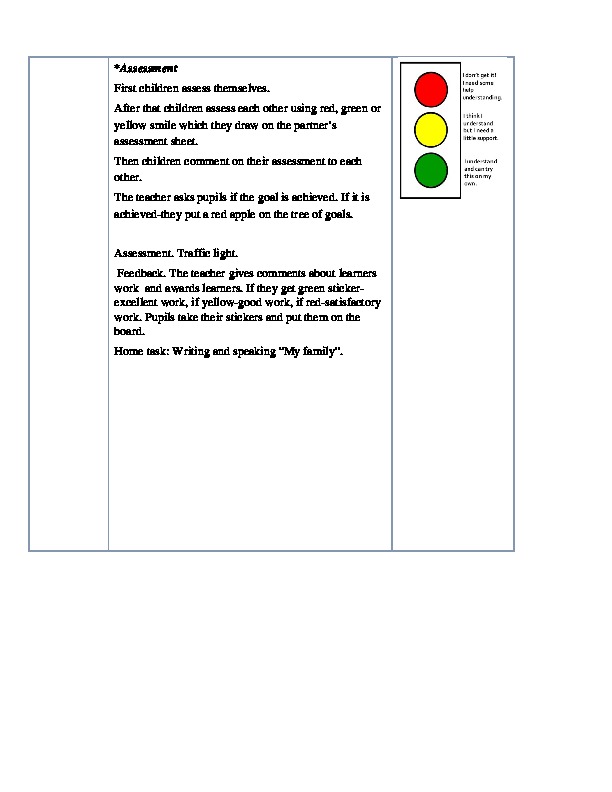

Бесплатный просмотр. Свидетельства участникам
для аттестации за минуту.

Undestand suppoted narratives, including some extended talk, on an increasing range of general and cirricular topics.
Use quantifiers many, much, a lot of, a few on a limited range of familiar general and curricular topics
Unit of lesson plan:
School: Shalkar orta mektebi
Teacher name: Tuleshova A. M.
Number present: 12
Lesson title
What we value 1
Learning objectives that this lesson is contributing to (link to the Subject programme)
5.L8 understand supported narratives, including some extended talk, on an increasing range of general and curricular topics
5.S5 keep interaction going in basic exchanges on a growing range of general and curricular topics
5.R2 understand with little support specific information and detail in short, simple texts on a limited range of general and curricular topics
5.UE2 use quantifiers many , much , a lot of ,a few on a limited range of familiar general and curricular topics
Lesson objectives
All learners will be able to: use new vocabulary
Most leareners will be able to: reconise and use quantifiers many , much , a lot of ,a few
Some learners will be able to: talk about special days and celebrations
Some learners will be able to: understand a text about celebrations
Language objective
Level of thinking
Values links
Careful attitude to special days and celebrations.
Cross - curricular
Previous learning
Revision of family relationships
Assessment criteria
Make up short sentences using new vocabulary.
Use quantifiers many , much , a lot of ,a few
Planned timings
Planned activities (replace the notes below with your planned activities)
Organization moment. Who is on duty today? What is the date today? What is the weather like today? What is the day of the week today? Who is absent?
“Hook’’strategy :Look at the pictures. What do you see? How do you think , what the theme of our lesson is?
Читайте также:

